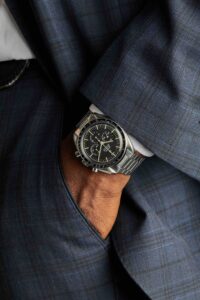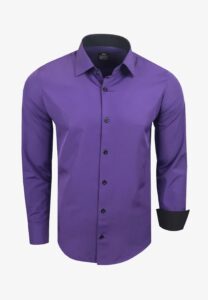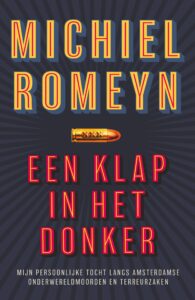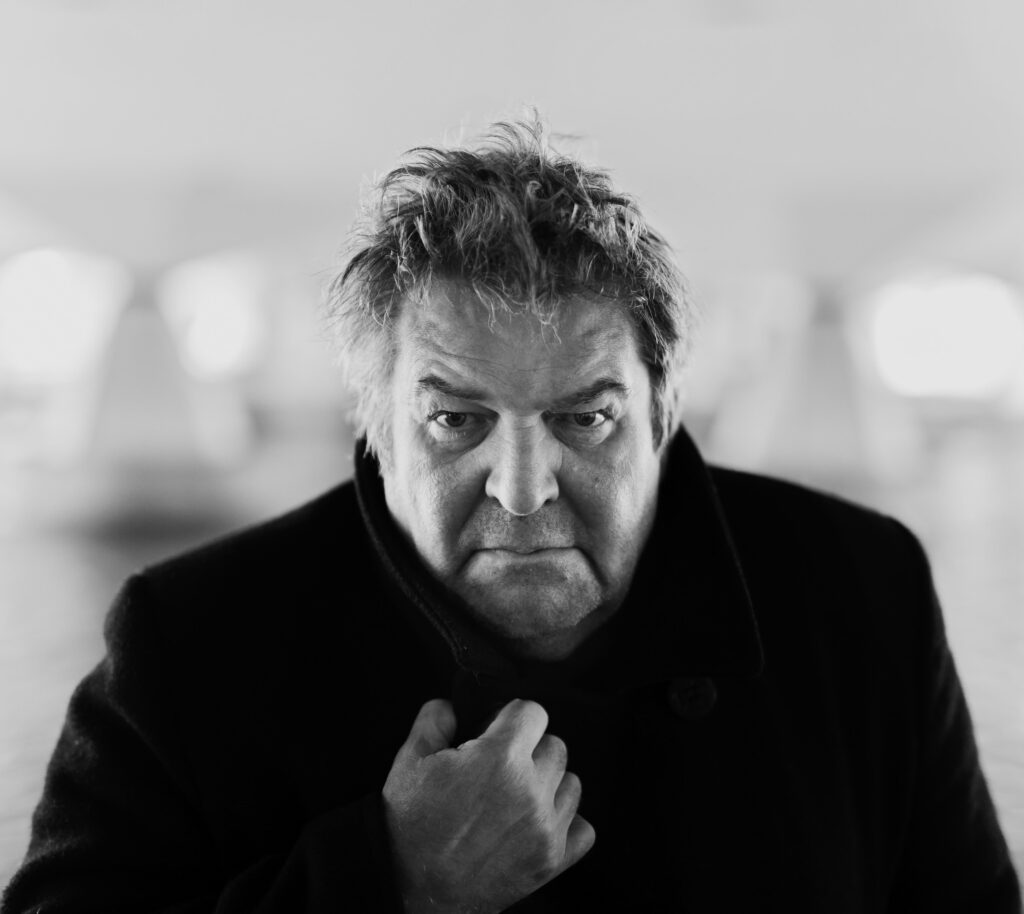Spoiler alertMichiel Romeyn has no style, he states flatly. He doesn't really care for designer clothes, he cherishes his thirty-year-old classic BMW Touring, he doesn't travel much and he prefers not to wear watches on his wrists or rings on his fingers - otherwise he will lose them anyway. He does, however, have an interesting fascination. And strong opinions. Gentlemen's Watch spoke to him about his recently published book and exhibition in which he reminds us how macabre death is for some - and how specific places set the stage for life and death within seconds.
Text: Rosan Bijpost Photography: Paul Tolenaar
Known for the comic Jiskefet, Romeyn has since also played many roles of criminals and villains. Not only on the big screen is this an important theme, it is also a common thread in his current works. In his latest book 'Een klap in het donker', Romeyn tours the Amsterdam underworld and visits historical crime scenes where gangsters, criminals and a lawyer, among others, breathed their last.
 "Liquidations have always fascinated me. But when one after another was killed in Amsterdam some 20 or 30 years ago, it caught my attention. That was the time of Holleeder. I found it exciting to go and look at those places. It has a high Telegraph content somewhere, something sensational. But it also has something abstract. The street turns into a kind of backdrop. You are standing in a place where there is someone walking around alive one moment, only to drop dead a second later.
"Liquidations have always fascinated me. But when one after another was killed in Amsterdam some 20 or 30 years ago, it caught my attention. That was the time of Holleeder. I found it exciting to go and look at those places. It has a high Telegraph content somewhere, something sensational. But it also has something abstract. The street turns into a kind of backdrop. You are standing in a place where there is someone walking around alive one moment, only to drop dead a second later.
In my opinion, you can and may say anything you like - at least I have no problem with that myself.
Someone having a heart attack can also drop dead on the spot, but that is different. In the case of murder, a liquidation, what matters to me is that it is contrived. There is something brooding going on. Someone is waiting, watching and scoffing. Only to then pull the trigger. The decision to end the life of another is very strange. But that is the nature of the beast, of human beings. Nowadays, it is only natural to slaughter each other. They might call that the dark side of man, but it is now a common good. It has become the new normal."
 By this, Romeyn is referring to the current situations and government policies in many countries, which in his view are totally idiotic. "I'm not looking for the bad in people, you just face it. Just look at the world around you. Putin, Trump... I hold my heart. Or that the PVV is now so big. You would have thought that almost impossible a few years ago, wouldn't you? That weirdo with the wig on his head. We have entered an idiotic era. The even bigger I era.
By this, Romeyn is referring to the current situations and government policies in many countries, which in his view are totally idiotic. "I'm not looking for the bad in people, you just face it. Just look at the world around you. Putin, Trump... I hold my heart. Or that the PVV is now so big. You would have thought that almost impossible a few years ago, wouldn't you? That weirdo with the wig on his head. We have entered an idiotic era. The even bigger I era.
You see huge rightwardness and with it social codes are disappearing. There is more and more loutish and prolife behaviour. But yes, it says more about the people who vote for Wilders, than Wilders himself. They think they are making the world a better place by doing so, but to me that is total madness. It will only get worse."
If I had long legs, and was a little less fat, I would go for Paul Smith clothes every day.
Romeyn has no hope that the world will be all right. Whether his book or exhibition might convey a message? Nor. "My works have to do with today's world. It is my interpretation. I find it interesting to do. To make things. I didn't come from drama school, I came from art school. I was always asked for the penurious, criminal or working-class roles. I found the criminal ones the most exciting. So now I make art about it, to get a better grip on it myself. That's what my book is about. For my exhibition, I drove with my wife to Utah Beach in Normandy. That is a kilometre-long beach where Allied forces landed on D-day. There is still a lot of human DNA in the sand from all the dead who died there.
I took samples of those, and photographed the surroundings. I also started photographing - long ago in Amsterdam - the paving stones where Van Kleef, Van Hout, Endstra and other figures were killed. Together, these make up the exhibition. There is no further meaning behind it. It is about impermanence. An observation. Something was there, and suddenly not any more. A very simple fact, really. But where the French Impressionists painted a little bridge or sunflowers, I find this appropriate to our times."
 In contrast to his current works, Romeyn's career also featured laughable creations. Known from Jiskefet, he was regularly pigeonholed as a comedian, but Jiskefet also had a dark side, according to Romeyn. "Take a closer look. They may be thigh-slappers, but with a wry, macabre side. Wondrously idiotic or black. Like Fawlty Towers or Monthy Python. You can laugh hard at those, but both of those are actually quite morbid too. Fawlty Towers is one big chaos and chain of painful events and Monthy Python is a wonderful world, but also a weird and wry one. There is no humour that exists without suffering. These days, it is different. Making fun of each other is no longer possible. People shit their trousers for fear of taking humour too far. I do find the guys from 'This was the News' witty. They go pretty far, that I think: oh jesus. You get more and more pointed out anyway. 'Well, well can you say that?' you hear in companies. In my opinion, you can and can say anything you want - at least I don't have any trouble with that myself.
In contrast to his current works, Romeyn's career also featured laughable creations. Known from Jiskefet, he was regularly pigeonholed as a comedian, but Jiskefet also had a dark side, according to Romeyn. "Take a closer look. They may be thigh-slappers, but with a wry, macabre side. Wondrously idiotic or black. Like Fawlty Towers or Monthy Python. You can laugh hard at those, but both of those are actually quite morbid too. Fawlty Towers is one big chaos and chain of painful events and Monthy Python is a wonderful world, but also a weird and wry one. There is no humour that exists without suffering. These days, it is different. Making fun of each other is no longer possible. People shit their trousers for fear of taking humour too far. I do find the guys from 'This was the News' witty. They go pretty far, that I think: oh jesus. You get more and more pointed out anyway. 'Well, well can you say that?' you hear in companies. In my opinion, you can and can say anything you want - at least I don't have any trouble with that myself.
I'm not looking for the bad in people, you just get confronted with that.
It is mainly the white man who likes to determine that. In Jiskefet, I played the character Oboema the white nigger. This character led to a huge fan base in, among others, the Surinamese community. It is mainly those white men who have trouble with it, who want to determine what you can and cannot say about another person. For me, it doesn't matter. I do care that it has to be actually witty. I'm not going to make fun of anyone."
 The sharp humour and fascination with incredible scenes leave little time and space for worries about outfits and style. "I don't like putting myself out with clothes. I am not vain enough for that. If I had the body for it, I would dress more accordingly. If I had long legs and was a bit less fat, I would go for Paul Smith clothes every day. Such nicely cut trousers and a nice jacket. I like that. But apart from that, branded clothes don't do anything for me. A casual jeansIn my opinion, a jacket, preferably a purple shirt -but you don't see those anymore- and a pair of Reebok trainers underneath is a fine outfit. I don't do jewellery. Watches, glasses, rings, I don't like having things on my hands, or I leave it somewhere. Doesn't mean I can't appreciate watches. A classic like Omega or IWC remains beautiful. But a watch with all the dials and screws or one of those giant dive watches. What to do with it?"
The sharp humour and fascination with incredible scenes leave little time and space for worries about outfits and style. "I don't like putting myself out with clothes. I am not vain enough for that. If I had the body for it, I would dress more accordingly. If I had long legs and was a bit less fat, I would go for Paul Smith clothes every day. Such nicely cut trousers and a nice jacket. I like that. But apart from that, branded clothes don't do anything for me. A casual jeansIn my opinion, a jacket, preferably a purple shirt -but you don't see those anymore- and a pair of Reebok trainers underneath is a fine outfit. I don't do jewellery. Watches, glasses, rings, I don't like having things on my hands, or I leave it somewhere. Doesn't mean I can't appreciate watches. A classic like Omega or IWC remains beautiful. But a watch with all the dials and screws or one of those giant dive watches. What to do with it?"
A slap in the dark by Michiel Romeyn is available from now.



